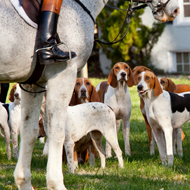
Japanese burial records show hunting dogs were treated like people
A study of dog burial sites in Japan has provided the best evidence yet that dogs are our ancient hunting companions.
Writing in the journal Antiquity, Angela Perri from the Max Planck Institute for Evolutionary Anthropology discusses how early dogs helped people to hunt, and may have been critical to human survival.
Perri began her research by joining a hunt of her own. According to Science, she wanted to get a sense of how dogs may have aided humans in taking down game.
She joined a group of Japanese businessmen on hunt in dense forest near Hiroshima. The hunters brought along a pack of bloodhounds and Shiba Inus which darted into the forest to find prey.
"After about 10 minutes, you could hear them barking,” Perri told Science. “It would have taken us four hours to find the boar by ourselves." The dogs proved even more valuable once the hunters caught up - warning when the boars were near and protecting the humans.
Inspired by her experience, Perri began to explore Japanese scientific literature for reports of ancient dogs. She focussed on the Jōmon culture of Japan, which is considered to be one of the best for analysing prehistoric hunter-gather groups.
She found that around 9,000 years ago, the Jōmon buried their hunting dogs in shell middens - large piles of sea shells - on low-laying coastal paths. According to Perri, the dogs were buried like people and placed singly in arranged postures.
"They looked like they curled up and went to sleep,” Perri told Science. “They were treating their dogs the same way they treated their human hunters."
In total, Perri uncovered over 100 burial records until the advent of agriculture around 2350 BP. After this, canine burials were only recorded as random piles of bones, suggesting dogs were eaten and just discarded.
She believes the fact that Japanese dogs were only valued when they would have made ideal hunting companions suggests they did indeed play this role.
"Greater numbers of dog burials during the later Jōmon phases may reflect a growing dependence on hunting dogs to extract ungulate prey from forests in an increasingly resource-strained seasonal environment," she writes.



 The Veterinary Medicines Directorate (VMD) is inviting applications from veterinary students to attend a one-week extramural studies (EMS) placement in July 2026.
The Veterinary Medicines Directorate (VMD) is inviting applications from veterinary students to attend a one-week extramural studies (EMS) placement in July 2026.